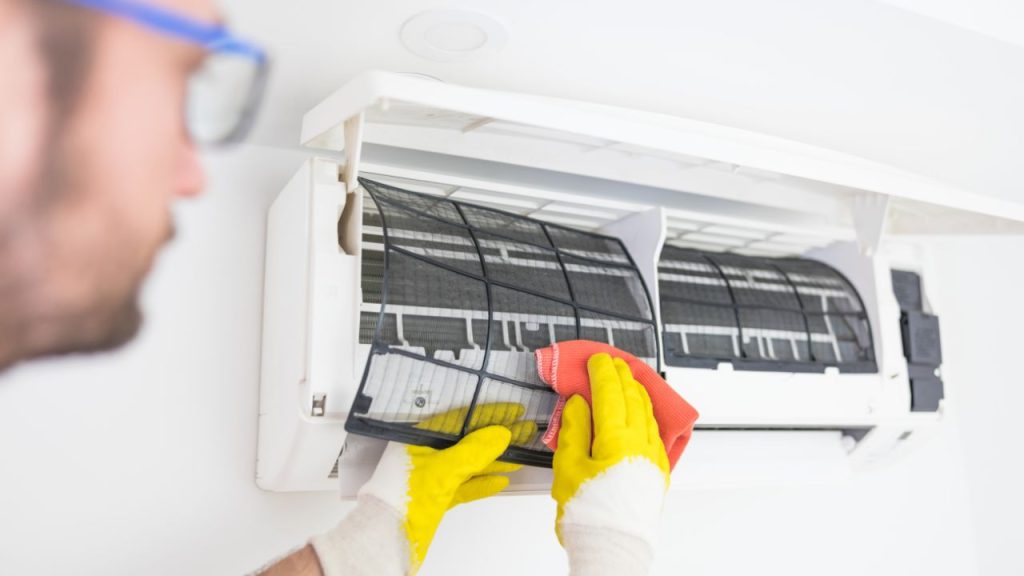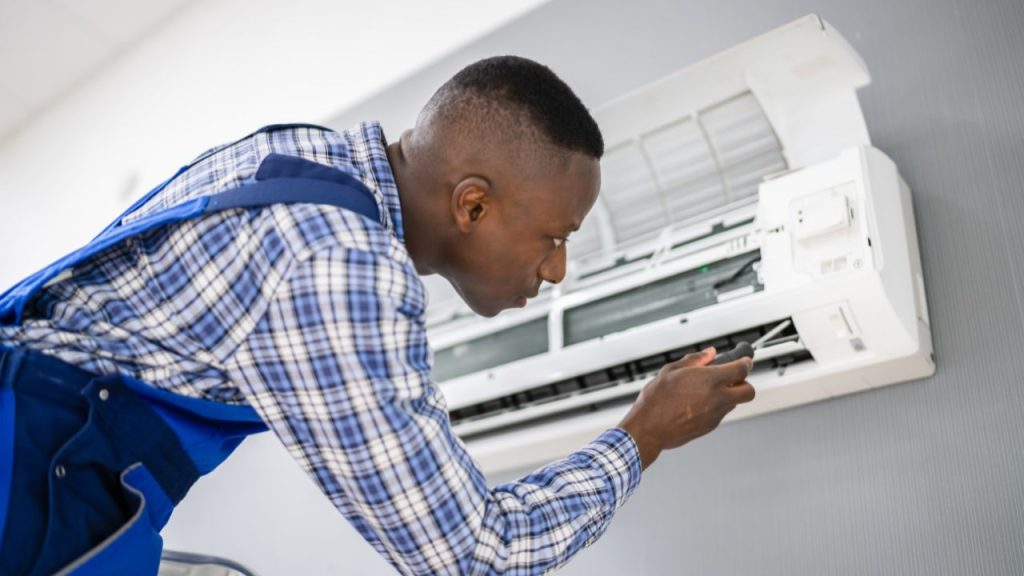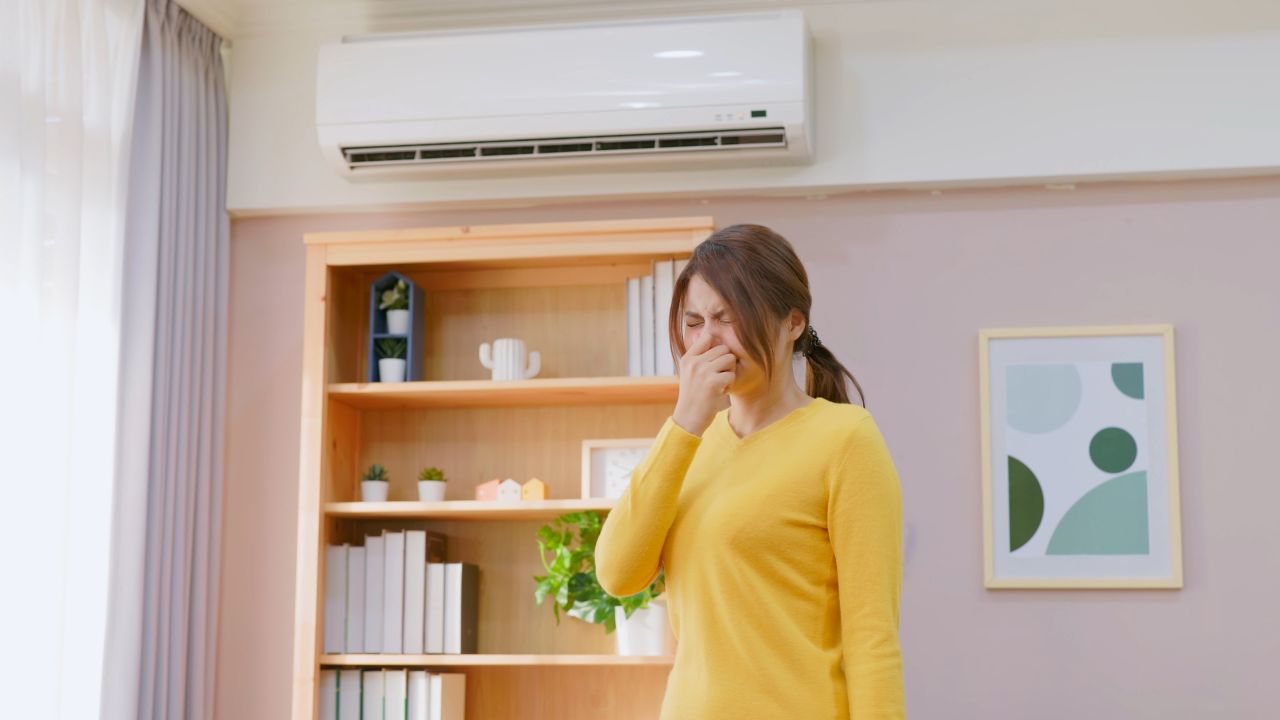Imagine trying to escape the heat on a sweltering summer day, only to be greeted by a strong fishy odor coming from your air conditioner.
You’re left wondering what could be causing this unpleasant smell, making it difficult to enjoy the cool air in your home.
There are a few common reasons your air conditioner might have a fishy smell, ranging from overheating electrical components to mold and mildew growth.
Identifying the root cause is crucial in finding a solution so that you can once again relax and enjoy a fresh, odor-free atmosphere.
In this article, we will explore the possible causes behind a fishy-smelling air conditioner and offer guidance on addressing and fixing the issue.
Please keep reading to learn more about this common yet pesky problem and how to prevent it from ruining your comfort at home.
1. Causes of Fishy Smell in Air Conditioners

Mold and Mildew Growth
Mold and mildew can grow in your air conditioner when there’s excessive moisture present.
This can happen for various reasons, such as poor insulation, lack of proper maintenance, or high humidity.
When mold and mildew accumulate on your evaporator coils, it can produce a fishy smell when the AC is running.
To prevent this issue, regularly inspect and clean your system and keep the humidity levels in check.
Bacteria and Moisture
Bacteria thrive in moist environments like your air conditioner and can produce ammonia, which smells fishy.
This mainly occurs when the evaporator coils and other components are improperly maintained and cleaned. To avoid this issue, you should:
- Schedule regular maintenance and cleaning for your AC system.
- Change the air filters periodically.
- Keep your air vents debris-free
Overheating Electrical Components
The fishy smell might also result from overheating electrical components within your air conditioner, such as wiring, outlets, or insulation.
This usually happens because of an overloaded circuit or a faulty electrical component and can pose a fire hazard.
If you suspect such an issue, call a technician to inspect and fix any electrical problems.
Clogged Drain Line and Algae
Algae can grow in your air conditioner’s drain line when clogged. As the algae continue to increase, they can produce a fishy odor.
To prevent this problem, ensure your AC’s drain line remains clean and unclogged. This will help eliminate the smell and prevent potential water damage due to leaks or overflow.
Dead Animals and Rodents
Sometimes, the fishy smell in your air conditioner can be attributed to dead animals or rodents stuck in the system.
These could be birds, mice, or other small creatures entering the ducts.
Ensure that your air ducts are properly sealed to prevent unwanted intruders, and if you detect a fishy smell caused by a dead animal, call a professional to remove it safely.
READ MORE: How to Keep a Bathroom Without Windows Smelling Fresh
2. Health Risks and Dangers

Allergies and Air Quality
When your air conditioner smells like fish, it can adversely affect your health, particularly with allergies and air quality.
The foul smell could indicate mold or mildew growth inside the HVAC system, which may thrive in humid environments.
Mold exposure can trigger allergies and asthma, causing sneezing, coughing, and difficulty breathing. To protect your health, you should:
- Regularly clean and replace air filters
- Check for signs of mold and mildew.
- Consider using a dehumidifier to reduce humidity levels.
Electrical Fire Hazards
A fishy smell from your air conditioner can also indicate electrical issues, posing potential fire hazards.
Problems such as loose wiring, circuit overload, or burning electrical components can cause the odor. These issues can cause circuit breakers to trip, flickering lights, or even fire accidents. To minimize the risks associated with electrical problems, make sure to:
- Keep your air conditioner and vents away from garbage, as nearby trash may contribute to the smell and attract pests that can damage your system.
- Inspect and update your electrical system to identify any potential issues.
- Always call professional air conditioner maintenance specialists for routine checkups and repairs.
READ MORE: Common House Repairs You Should Call A Professional
3. Detecting and Preventing Fishy Smells

A fishy smell from your air conditioner can be caused by various factors such as mold, overheating electrical components, or poor ventilation.
Cleaning and Maintenance
To help prevent fishy smells and improve your indoor air quality:
- Clean or replace your air filter regularly, as a dirty filter can reduce airflow and cause odors.
- Schedule regular maintenance with a certified HVAC technician to ensure your AC system functions properly and efficiently.
- Inspect and clean your ductwork to remove any debris, mold, or mildew causing unpleasant odors.
- Ensure your condensate drain pan is clean to prevent mold buildup and foul smells.
Inspecting Electrical Components
An overheating electrical component can be the source of a fishy smell. To address this issue:
- Check your air conditioner’s electrical wires for any damage or loose connections that might cause overheating. If you need clarification on this task, it’s best to consult a certified electrician.
- Schedule regular AC maintenance with a certified technician to inspect and fix potential electrical problems.
Addressing Mold and Mildew
Mold and mildew thrive in damp environments and can be a source of fishy odors in your AC system. Here’s how to deal with them:
- Regularly clean your HVAC system, particularly the air filter and ductwork, to prevent mold and mildew growth.
- Check for any leaks around your AC unit that might contribute to a damp environment.
- Inspect your air vents for any signs of mold or mildew, and clean them as necessary.
Proper Ventilation
Good ventilation is crucial for maintaining a fresh and healthy indoor environment. To improve ventilation:
- Ensure your air vents are unobstructed and open, allowing adequate airflow throughout your home.
- Ensure your HVAC system is properly sized for your home, as an undersized unit may need help to properly ventilate the space, leading to unpleasant smells and higher energy bills.
READ MORE: How to Create an Urban Garden in Your Hipster Home
4. Resolving Odor Issues

When an air conditioner smells like fish, it’s essential to resolve the issue to maintain a comfortable environment.
Calling a Licensed Electrician or HVAC Specialist
If you suspect an electrical issue is causing the fishy smell, it’s crucial to call a licensed electrician or HVAC specialist.
Overloaded circuits, wiring issues, and defective components can all contribute to unpleasant odors.
An expert can inspect your system, identify the source of the problem, and recommend necessary repairs or replacements.
This will not only help eliminate the smell but also prolong the lifespan of your air conditioner.
Replacing Defective Components
Dirty air filters, mold, or mildew growth on the evaporator coil can cause your air conditioner to smell like fish.
Replace your dirty air filter and clean the intake vent to resolve this. A more thorough cleaning of the evaporator coil and condensate pan might be necessary for mold or mildew growth.
Call an HVAC specialist for a professional assessment if you suspect a more severe issue, like a damaged compressor.
Implementing Fresh Air Solutions
External odors like smoke, chemicals, or even rodent urine can sometimes infiltrate your air conditioner.
In these cases, implementing fresh air solutions can help. Here are a few ideas:
- Ventilate the area: Open windows or doors. This will flush out lingering odors and improve air circulation.
- Use air cleaners: Place air purifiers near the intake vent or other parts of your home. This will help eliminate pollutants and unpleasant smells.
- Clean nearby sources: Remove garbage, pet waste, or other odor-causing sources near your AC unit.
Following these steps can effectively resolve odor issues with your air conditioner.
Regular maintenance, like cleaning your air filters and inspecting your system, will help prevent future problems and keep the atmosphere in your home fresh and pleasant.
READ MORE: HVAC Maintenance and Care Made Easy with Modern Tools and Equipment
Frequently Asked Questions
Why is there a fishy odor coming from my air conditioner?
There could be several reasons for a fishy odor from your air conditioner, such as bacteria growth on the evaporator coil, stagnant water in the condensate pan, or burning electrical components. Overheated electrical components can produce smells similar to fish or ammonia.
How do I eliminate the fishy smell from my AC?
To eliminate the fishy smell from your AC, check and replace the air filter if it is clogged or dirty. If the smell persists, check for mold or mildew buildup in the system and clean it. Regular maintenance, cleaning, and air filter replacements will help avoid unpleasant smells.
Can a dirty AC filter cause a fishy smell?
Yes, a dirty AC filter can cause a fishy smell. Air filters are designed to catch dust and debris, but if they become clogged, they might harbor bacteria, mold, or mildew, leading to unpleasant odors. Replacing your filter regularly is essential to prevent the buildup of odor-causing contaminants.
Does an electrical issue cause a fishy smell in my air conditioner?
An electrical issue could cause a fishy smell in your air conditioner. If electrical components within the unit are overheating, they can emit an odor similar to fish or ammonia. Addressing any electrical issues is essential, as it can also lead to safety hazards.
Is the fishy smell from my AC related to carbon monoxide?
The fishy smell from your AC may not necessarily be related to carbon monoxide. However, it’s essential to be aware that some burning or overheating components in an HVAC system can produce carbon monoxide, a serious safety concern. If you need more clarification about the source of the smell, consider calling a professional to inspect your system.
Why does the smell become stronger when I turn the heat on?
Turning on the heat can intensify the fishy smell because the heating process may cause the affected parts to produce more odors. Overheating issues, stagnant water, mold, or bacteria growth can become more concentrated when your system works harder, leading to a stronger smell. Check your unit for any issues if you notice a stronger odor when turning on the heat.



